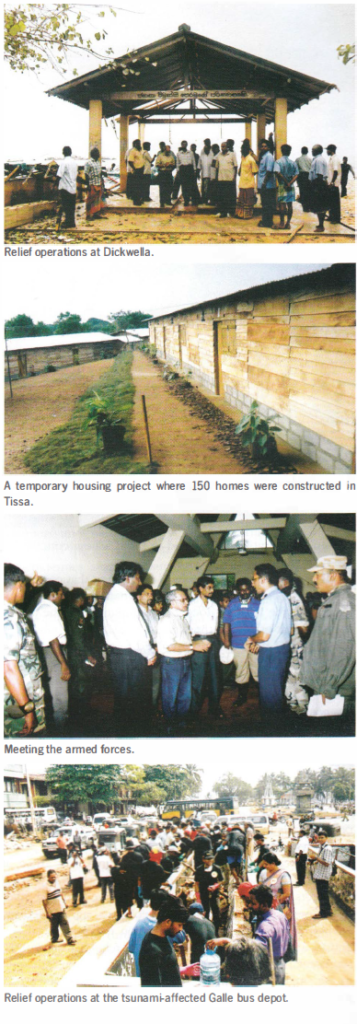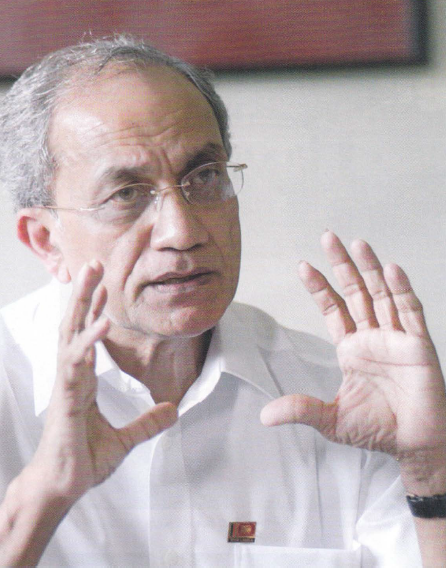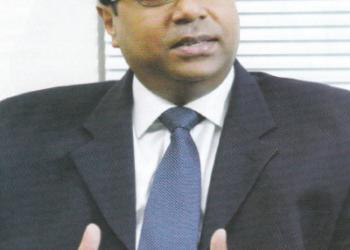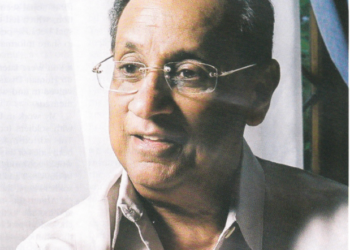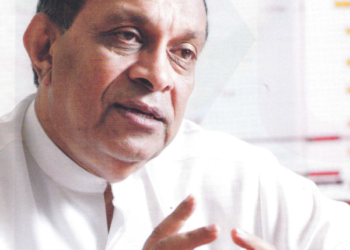There is controversy today about the role and activities of the JVP in the post-tsunami period, involving criticism of government initiatives regarding relief, reconstruction and rehabilitation, and the reported lack of consultation with the JVP in matters of governance. Media reports refer to major rifts between the PA and JVP, the major constituents of the UPFA Government.
In the context of this situation Somawansa Amarasinghe, the leader of the JVP, gives his candid views about current government policy, the bureaucracy, and what the JVP expects to be done in the field of post-tsunami resurgence of the people and the country. It seeks the use of all resources to build a new country and not just rebuild the old. Amarasinghe admits to differences within the UPFA, but describes them as inevitable in a coalition. He maintains that all criticism by the JVP is constructive, and is made with full awareness that the JVP is also part of the government and anyway it would also have to be answerable for any shortcomings in leadership and the government.
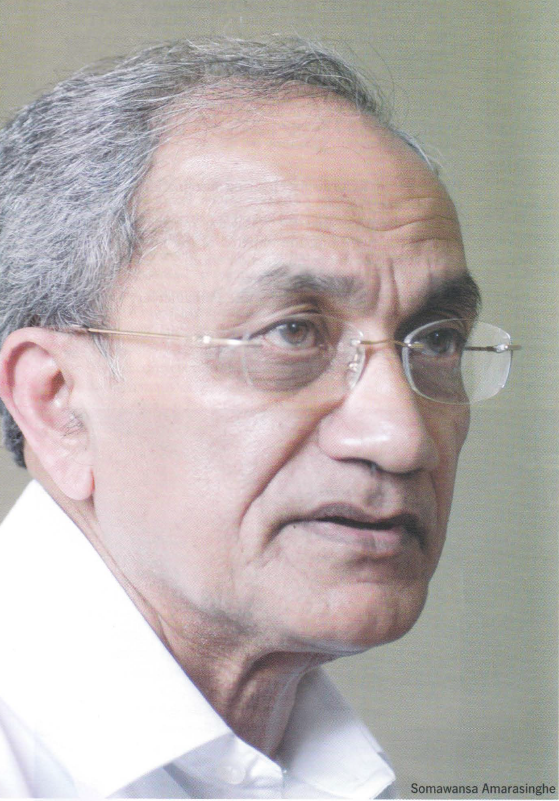
By Lucien Rajakarunanayake Assisted by Rashmini Mather
It is a month after the devastating tsunami. I know that the JYP has been involved in relief activity but have you been personally involved?
Before answering the question I would like to express our sorrow for the fellow people of this country, including businessmen, women and industrialists, and foreigners who lost their lives during the tsunami as well as extend our sympathies to the families of victims here and abroad. The JVP has been actively involved in a lot of relief activities; clearing debris and dead bodies, cleaning toilets, providing health services and shelter, and distributing food and clothes. I myself was involved in clearing and other activities. I visited the Matara district on the evening of December 26 but rushed back to Colombo the next day to organize supplies and to coordinate our people from other unaffected districts. I started the year 2005 by visiting the disaster areas down south and in the Eastern Province.
Do you agree with the government’s overall strategy to tackle the reconstruction and rehabilitation of the devastated areas and to help the affected communities?
First and foremost, I would like to pose the question, is there an overall strategy? Is there a vision? We should not speak of reconstruction. We need to construct a new country, a new nation. Rebuilding must be removed and forgotten from our agenda. We’re not interested in building the same shanties along the coast or rebuilding the old railway line. The natural disaster must be viewed as a challenge that could be turned into an opportunity, which we must make use of. We have received some funds and there are more funds pledged by the international communities but we should not be preoccupied with what is to be given in the future. We have some money in our hand so let us plan according to the ability of our people and the financial ability of the government. We must utilize what is currently available in a beneficial manner. The JVP is not satisfied with the initial progress made by the government in the relief effort. We must not talk about international standards blindly.
Immediately after the tsunami, there was a humanitarian revolution in this country, which the government should have learned a lesson from. The civil society, here I am referring to the ordinary men and women and not the NGOs, religious leaders, private sector and well-wishers along with the armed forces, police, and JVP of course, all came out to help selflessly. They gave their belongings and food and strangers gave shelter to those who lost their homes. The government was not speedy in delivering the necessary supplies to the affected people but fortunately the vacuum was filled by the civil society in this country who has a tradition of helping, especially in times of disaster. The civil society served selflessly for the people and they are a good example to the government. This is a time when all the political parties should play a role. The government should have invited the other political parties. It is the duty of the respective parties whether they wish to participate in the relief process or not, and the people should decide who is suitable or not. That is why we have proposed to the President and other parties that for at least two years. we should forget about individual party agendas and do some serious national thinking.
You did mention the notion that various people have been appointed to the task forces and no one really knows on what basis they were selected. Can you elaborate?
I must emphasize that all the appointed people are good bureaucrats and good administrators. They haYe their respective roles but not in the planning of cities and not in taking political decisions. The leadership should be given to the politicians who can then delegate responsibilities to the administrators. These people in the Center for National Operations (CNO) are not accountable and their appointments are not transparent. They are not elected representatives of the people. Even the politicians are unaware as to how they have been appointed. The politicians are accountable to the people of this country; we are answerable to future generations. We need to build a new country for the new generations. There is a so-called high-level committee that consists of the leaders of all political parties, commanders of the armed forces, and the IGP, but does this committee have the power to implement or amend the plans of the C Q? I doubt it. The CNO have already prepared ‘plans and have made presentations of the proposed new towns, railways, bridges, etc. Others may be amazed by the proposals but not the JVP. They are good plans made by the UDA, an institution that has good architects, engineers and technicians. However, the UDA i not the only institution that can plan towns. There are town planners, engineers, social scientists and skilled private sector architects in this country, so why not consult them? This is the time when we should consult all stakeholders, the professionals, the private sector, etc. Let me emphasize that it is the duty of the President to convene all those who are professionals in all fields in the construction of a new country. Professionals should be given an opportunity to play a role in discussing the current situation and help arrive at a solution based on their respective professional expertise. Architects settlement experts, engineers, medical and other health personnel. meteorologists, geologists, agriculturalists, environmental experts, communication experts, social scientists. and other stakeholders such as religious dignitaries, representatives of workers. farmers, fishermen, businessmen in the small large import and export sectors, women and industrialist must be invited.
Authorities speak of hospitals and towns of international levels. However, the people are not interested whether they are of the same standard as in other countries. We should plan and design our hospitals, roads and houses according to what we have in our hands – our local professionals and our present financial abilities. Politicians may be interested in engraving their names on plaques. People should not have unrealistic dreams; we must control our finances, harness the local talent and mobilize all the people to serve the country selflessly. That is what all the leaders should do, including the leaders of the JVP. All must be included in preparing a single vision for the country. This is an opportunity to strengthen the state sector and encourage our private sector companies, particularly the local construction industry. We should not make the same mistakes of offering contracts to overseas firms as we did with the massive Mahaweli project years ago. If we employ foreign companies, it will lead to corruption and we will not reap the benefits of promoting our local industries and private companies. They must be uplifted in order to compete internationally.
Although you criticize the government, the JVP is a part of it with four ministers in the cabinet. Then shouldn’t part of the blame be placed on the JVP too? Yes, that is exactly why we are concerned and are criticizing the government. However, this is not destructive or personal criticism, it is friendly, constructive criticism. We are not attacking any individual. We are only attacking the approach. There is no definite strategy so we are concerned. There is no collective leadership. We do not believe in one man’s or one woman’s show – ‘Humanum est errare’. We are partner to this government but sometimes we feel very regretful for becoming a part of it when we see their actions. It is the responsibility of the JVP to stand up against wrong; that is what the people expect us to do. The people have faith that we will fight for the betterment of this country, against corruption and everything that is not acceptable by the people.
How do you explain the confusion that is still prevailing over the number of deaths in the south?
As a result of the tsunami, many Grama Sevakas lost their lives, subordinates and office premises. We did not know where the files were and how to communicate with the subordinate officers. During the first week, everyone was in a terrible trauma, including the officials, and we had to console them and convince them to return to work. They had lost their loved ones and everything so how could anyone expect them to perform their duties? We have been helping them with their jobs but it has been understandably difficult to acquire accurate statistics about the numbers dead. Data has to be collected at a grassroots level but our administration and bureaucracy set up is very slow. The lethargy of the bureaucracy in this country is disgraceful. But I must say that there are efficient and hardworking bureaucrats also. However, we blame the government because there was an offer from the university students and professors to carry out census studies in the affected areas, but it was not taken up. These are the shortcomings but even now, it is not too late.
One month is not a short period. Honestly, we should be ashamed to say that we still don’t know how many people have died during the tsunami. especially in the areas other than the north and east. The north and east are an exception because since 1981, the LTTE does not allow a census to be conducted in those areas for other reasons and so neither the government nor the LTTE know how many people were residing in those areas and so we don’t know how many died during the tsunami.
There are already indications of corruption creeping into the government’s relief and reconstruction process. Would the JVP be sufficiently alert with regard to corruption?
At this early stage, we cannot point fingers without clear evidence. But yes that is our duty, given by those who elected us. There is a certain section of the JVP who will act as a watchdog. We invite people, anybody from any political party or those not politically affiliated, to please let us know the truth. We stand by them because we are selflessly serving the country.
The media has highlighted recent rifts within the UPFA government, particularly over the possibility of accommodating the LTTE in national relief efforts. The general position taken is that the LTTE is required since they control most of the north of the country. What are your comments?
Fundamentally, there is no rift as such. The PA does not follow the same line as the JVP. They or we need not do so. The MoU clearly states we have our differences but both parties are unconditionally for peace. To give a role in national construction only to the LTTE is undemocratic and unacceptable to us, and any person if he/she is a true democrat because the LTTE is not elected by the people. We arc aiming at a democratic country, a new country. The tsunami disaster is a challenge and an opportunity for this country. This is an opportunity to construct while simultaneously safeguarding all the values that are being protected by all democratic nations such as multi-party democracy, free elections and accountability. Everyone including the international community and private sector must help this country, not only to construct a new nation, but also to restore democracy, especially in the north and east. We stress that structures established to lead the construction work must consist of all the parties and communities, including the armed forces and police because they had a crucial role in the aftermath of the tsunami. Even the TNA MPs and Anton Balasingham praised the armed forces and the police who admirably saved people’s lives. They couldn’t do otherwise. Everyone should be included in this process and the same representation should go down to the provincial or district level. We must encourage all communities to live and work together harmoniously like in the Western Province. We must make the whole country a place for the Sinhalese, Tamils, Muslims and Burghers to live together, enjoying democracy and equality.
What have you to say about the criticism directly leveled at the JVP as a party that i discriminatory during aid distribution and attempting to gain political mileage during these tragic circumstances?
Blatant lies. How can we do that? You can ask the people living in the welfare centers whether the JVP has discriminated against anyone and they will tell you the truth. We are used to this type of mudslinging. Although some irresponsible people talk about JVP banners and badges, we were concentrating on how to safeguard the government. Why were there no food riots or epidemics after the tsunami? The credit goes to the local and international doctors first but it is also because the JVPers cleared debris, buried dead bodies and cleaned toilets with their own hands. That is how we worked and how we instructed our members to do their work. At the very beginning after the tsunami, there were two governments – one who performed before the TV cameras and another government on the ground with the people, for the people. As part of the government, it was the responsibility of the JVP to safeguard the whole government.
Despite the tragedy, most people including the international community see this as an opportunity tO put to rest ethnic and political differences as well a to provide a better quality of life to the poor. Do you agree?
Firstly. I would like to extend the thank of the people of this country to the international community who has generously assisted our nation at this difficult hour. Everybody need co see a peaceful country. I would say chat more than any ocher faction in the world, we – the JVP – are for peace. but a peace with democracy and dignity. Some say that this is an opportunity for peace. True, but it is also an opportunity to construct a new land, a new nation. It is an opportunity to defeat all differences because the tsunami washed away all differences and boundaries I have visited almost 100 welfare camps where I haYe Christians, Hindus, Muslims and Buddhists, living, cooking, eating, and sleeping together in temples, churches and mosques. It is unprecedented to see people from all communities living together as Sri Lankans.
We must safeguard democracy. Without democracy and equality, there will be no peace in this country. After World War II, the Western world helped Germany, Italy and Japan to rebuild their countries. They built new nations and helped them to restore democracy, to eradicate fascism and dictatorship in these countries. The world would have been entirely different if not for those decisive actions. We admire and are very grateful to all the countries, the people and governments that have helped us during the difficult hours. We urge them to further help us to construct a new nation and also to restore democracy, especially in the north and east. The West stands for democracy, free speech, free elections, accountability, and most importantly, children’s rights. As I said when I met the UN Secretary General, pious statements will not work; we require not just words but deeds. We need the international community to take essential steps to establish democracy in this country.
Leadership is required in a time of crisis. Generally when disaster strikes, it so results that the government’s able handling of the situation gains them popularity. Yet this does not seem the case in Sri Lanka. Is there a proper leadership and do the people see the government as doing something essentially good for them?
There is leadership, I wouldn’t say there is a vacuum, but that is not the type of essential leadership required for this country. The most sacred need here is for the leaders of all the political parties to lead the people in this hour. The JVP is not sectarian. We undertook various activities as part of the government. We do not want any credit but what we did must be respected. During a crisis, true leadership becomes visible and parties that lead and work with the people are visible. No one can stop them. That is why the JVP is being clearly seen by the people at this time. They have seen our commitment and our sacrifices, not only in the aftermath of the tsunami but over the last 39 years. This is one of the most decisive moments in the country. \Ve are always open to learn and are still learning and continue to learn from others. Other parties should also learn from the JVP, a party who has made sacrifices, worked tirelessly and did what the people wanted.
Do you think the actions of the JVP have made the people gain confidence in the government’s ability to lead?
The people are not 100% content with the work of the government. Yet it is the duty of the government as a whole to help the people. I urge those who are trying to draw a line between the PA and the JVP, not to do so. We belong to the same government. We did what we did after the tsunami as the main partner of the government. We are not sectarian.
Of course. some blame us for having banners and wearing badge . We did it because it is the duty of a political party to help the people to identify who are the true leaders and which i the real people’s party in this country. All the parries have their own political agendas and we are no different. We don’t hide that fact. We had and continue to have a political agenda but we can suppress and forget about that if the other parties are prepared to get together to build this country. We are doing everything to become the ruling party of this country, not by wrong means but by convincing the people. We have sacrificed a lot in our mission. This is an opportunity to launch a humanitarian revolution with the JVP. There is no clause in che MoU char the PA and JVP will not operate separately. Each has its own political agenda. We operate separately but as part of the government and we govern together. The government can now receive credit for the work we have clone. That is why the NP has taken a few steps back when it criticizes the government.
What do you see as the next step in recommencing the peace process?
The government is prepared to have negotiations without imposing any conditions. The LTTE should forget about the ISGA and come to the negotiation table to have discussions. They should allow others to express their voices and views regarding the peace process. The LTTE should not impose the condition that the talks must be based on the ISGA. They must remove that obstacle and be more reasonable. The LTTE must show that they are prepared to restore democracy in the north and east. They must accept that the majority of the Tamil people living in the north and east do not agree with what they say. Because the LTTE is armed, people are not expressing their views. Yet there is an opposition in the north and east who are for democracy. The LTTE will not be able to carry on like this forever. The people will agitate and fight for democracy. Before the tsunami, the democratic movement was just gathering momentum. After the tsunami, some of the younger Tamil generations dealt with Muslims and Sinhalese for the first time. I saw in Central College, Kinniya, those who were killing each other were living in the same classroom, cooking in the common kitchen, eating together, and living like friends. In this case, the tsunami has united the people and compelled them to think in a new way, and I earnestly hope that they will.
There are reports and obvious signs that the JVP is being virtualJy censured in the state media. What are your comments?
I will assure you that no one could censure the JVP. The most powerful media in this country is the word of mouth; people talk to each other. In the affected areas, no one watched TV. Even those who did not lose their belongings did not watch TV because they were mourning the dead. They only saw what is taking place on the ground. We’re not worried about the media’s reporting because the people know the truth. But we have written to the minister reminding him that there is a clause in the MoU signed by the JVP and the PA to say that we should not use state media as if it is our own property. I am sorry to say that this practice is evident. We are not only talking about the right of the JVP, the state media should report the truth to the people, they must represent the general opinion of all the parries and the public’s needs. There must be balanced reporting, we must not forget that people have given us a mandate to do that. We are inviting all the other political parties to work together to build the country. We are not simply preaching bana. It is the duty to practice bana before preaching; preaching is insufficient.
